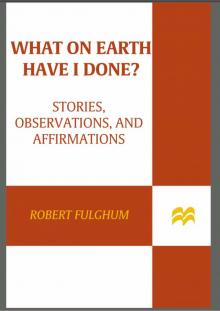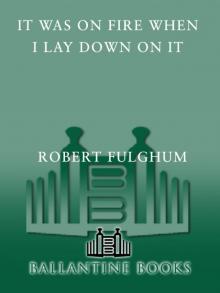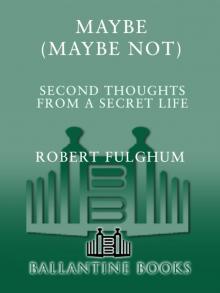- Home
- Robert Fulghum
Maybe (Maybe Not) Page 9
Maybe (Maybe Not) Read online
Page 9
“You…little…you…little.… Aw, hell.”
The stall door swings open.
A five-year-old girl emerges in tears, her lips puckered in fierce refusal and her mind set in cement as she marches solemnly past the onlookers and out the door.
Her father follows. Big man in a black Stetson. Red-faced mad. Embarrassed. Defeated. Humiliated.
Nobody pushes him around. Nobody tells him “No.” But his five-year-old girl-child has done it. And she has also not done her “business.” And there’s going to be trouble in the air and a fracas when they get to Denver. He storms out the door after the child, fit to be tied.
The impromptu Committee of Wise Men who have witnessed this drama and who remain behind in the sudden quiet of the men’s john render their judgments.
“Sure glad I ain’t in his shoes.”
“Ought to take the big guy into the bar and buy him a drink.”
“Women—don’t know what’s worse trouble, the little ones or the big ones.”
“That kid’s gonna ’splode at thirty-five-thousand feet.”
A guy washing his hands speaks with the wisdom of Solomon.
“If it had been me, I’d have given her a banana split, a hundred dollars, all the presents she could carry, and a United States Savings Bond before I would have got on that plane with her.”
Later, I saw the man and his child headed back to the men’s room in a big hurry. The little girl’s disposal system had settled the matter. Now she had to go. The last I saw of father and daughter they were sitting side by side in silence. Just the two of them in the otherwise empty departure lounge.
They missed the plane.
I wish I could have heard him when he called his wife to explain.
Father and daughter will survive this ordeal.
Time will turn it into family legend.
This is the kind of story a father will save to tell about his daughter at the rehearsal dinner of her wedding. It will be funny, especially with the embellishments fathers are prone to make. It is she who will be embarrassed this time. But the father will make it clear, as fathers sometimes do, that he’s proud of this independent-minded child—has always been—and the groom had better understand that he’s marrying a strong women who has been thinking for herself for a long time.
Though the formal study of music was not part of my education or family life, I have always wished otherwise—always yearned to speak the language and know the customs that would give me a passport to that land across the border separating an audience from the stage.
How I have wished to be able to play or even conduct—to be part of the orchestra somehow, and not forever confined to a seat in the audience!
In All I Really Need to Know I Learned in Kindergarten, I mentioned my respect for symphonic music. Beethoven’s Ninth in particular. In my secret life, I fantasized that someday I would rent a hall, a symphony orchestra, and a great chorale—and personally conduct that giant piece of music while simultaneously playing the kettledrum parts.
About a year after the publication of Kindergarten, I received an astonishing call from a representative of the Minneapolis Chamber Symphony. The fantasy in my book had been noted. Would I be interested in conducting at least the final movement of the Ninth? My presence would give them some useful public attention, and I could fulfill my dream. How about it?
I assumed they knew what they were doing, or they would not have asked.
They assumed I knew what I was doing, or I would not have written knowledgeably about Beethoven.
And I assumed that what I had always heard was true: that an orchestra really doesn’t need a conductor. All you had to do was give the downbeat and gyrate your arms in time to the music all the way to the end and take a bow.
As for Beethoven and his Ninth Symphony, I had read the available literature and attended live performances of the piece. On many occasions I had conducted it—while standing alone in my living room.
Of course. I could do this.
On behalf of my new self-image as the Legendary Fuljumowski, I accepted.
And thereby set in motion a wave of extraordinary events. It will take a while to tell you, but as in a symphony, all the small parts are necessary for the whole.
There were not just a few things I did not know about what I had got myself into. For one thing, the orchestra was in turmoil—in one of those seasons of self-destructive chaos that arts organizations are prone to endure. Its founding conductor had been fired by its board. Key musicians had resigned in protest. A new conductor had not yet been hired. Despite the catharsis and purge, planning for the coming orchestral season was necessarily being carried forward by an office staff who knew a lot about promotion but not as much about me and Beethoven’s Ninth as they should have.
By the time the new conductor arrived, the season had been announced. He and the orchestra were privately appalled to hear about me. The conductor came to visit me in Seattle, and with gentle forbearance he inquired:
“Just how well do you read an orchestral score, Mr. Fulghum?”
I replied, “I don’t read music at all. Is that really a problem?”
There was a long pause in the conversation.
He explained that the Ninth was so difficult that most professional conductors wouldn’t attempt it until they had years of experience.
He explained that in the final movement alone there were at least thirty-one places where the conductor had to stop and start the orchestra with sensitive changes in tempo.
He explained that a chamber orchestra did not normally include the Ninth in its repertoire, since they had only twenty-six musicians and must add players for big pieces. Not only would there be fifty musicians to lead, but there were a hundred members of the chorus to conduct, plus four soloists. Though they were all professional musicians, very few, if any, of the players or singers had ever performed the Ninth. Even if they could play and sing the music, getting the group to come together as a cohesive ensemble would be a major task.
He explained that while I was doing so well in my living room waving my arms, I was about a half-second behind the music and could leave and go to the bathroom and come back and they would still be playing. In the real concert setting, the conductor must have the complete score in his head. In the real concert hall, the conductor must be thinking seconds ahead, knowing everything that had happened, was presently happening, and was going to happen in the next minute—all at once.
He explained until he reached a mental impasse.
“In sum, what you want to do is…is…is…so…so…completely …”
He couldn’t find the words.
“But I really, really want to do this,” I pleaded.
Another long pause in the conversation.
He said, and I quote directly: “We are in deep shit.”
He had found the right words, all right—he had finally come up with a formal musical term I could fully comprehend.
To his surprise, and even to my own, I was not dissuaded.
“But could it be done—I mean, if I worked hard enough and long enough and wanted to do this badly enough? Is it possible?”
“Maybe.”
We made a deal. He would help me in every way he could to learn conducting in the most elemental way. Which proved a little easier than I expected, since clarity and simplicity and consistency were far more important than dramatics.
I promised to do something I had not done since high school: to learn something—in that wonderful phrase—by heart. To memorize the piece so thoroughly it would always be a part of me.
And to translate the score into some idiosyncratic form I could follow.
We would give it six months. If I could pull it off, well and good. If not, I promised to become catastrophically ill a week before the performance and not show up at all.
When I went to work on the Ninth, I fell back on my college skills. On that attitude that says there is no intellectual task that cannot be performed
between noon on Sunday and a 9:00 A.M. Monday class, if that’s what stands between you and passing a course. If you’re worried enough and scared enough and desperate enough, you can do miraculous things with your mind.
Not only could you read War and Peace if you had to, you’d even consider writing a sequel to War and Peace. Thinking back on what I pulled off to get my B.A., Beethoven’s Ninth seemed less daunting. It also helped my morale when I learned that the first time Beethoven conducted it in rehearsal, he crashed it—never got through it. Beethoven bombed.
Learning the Ninth may have been the hardest and most exciting intellectual challenge of my life. It was so impossibly absurd a thing to attempt I could not turn away. How bad could it be? The worst I could do was bring about a hilarious debacle nobody would ever forget. At best, I could actually do it.
This was a must. A crazy, unimaginable, no-way-out must.
One week before the concert, I presented myself to the maestro in a nervous-but-ready-as-I’ll-ever-be condition. We worked daily. While he played through the score on the piano, he cajoled and shouted and sang me up and down the changes.
He never said it, but I believe to this day he knew I couldn’t do it and he knew I knew I couldn’t do it, but he would leave it to the disaster of the first rehearsal to speak the truth to me.
This man has a Yale Ph.D. and is a gentleman and a scholar. He also has a wicked sense of humor, so I also suspect he did not want to miss out on what promised to become one of the great comedy moments in recent symphonic history.
And speaking of truth, it was only at this stage that I learned about the distemper of the orchestra. The wounds of the war over the leadership and personnel changes in the orchestra were not healed. Contract negotiations between the union and the board had not been settled. And to top it off, the season would begin with the tacky idea of a chamber orchestra doing part of the Ninth with an amateur wannabe at the podium.
It was true—they didn’t need a conductor.
What they needed was a minister.
I knew how to do that.
By looking at the orchestra through the lens of ministry, I saw the obvious—namely, that musicians appeared to be a great deal like people I knew well.
It’s easy to be fooled. When you sit out there in a great concert hall and these handsome, beautiful, formally dressed, talented people walk purposefully onto the stage with their shining instruments, they seem like minor gods. Not a care in this world.
If you go to a closed rehearsal, where only the musicians are present, you will find a raggedy bunch of people not unlike those you see in a checkout line at a supermarket. They have come to work—to do their job—and go home. Since they are overworked and underpaid, you quickly learn that the beautiful black outfits you see from the audience are, upon closer examination backstage, likely to have been assembled from the local thrift shops.
They had children, wives, husbands, homes, hopes, dreams, and all the rest. All had committed their lives to the hardscrabble road of the professional musician at some sacrifice to the usual quality-of-life standards. They made sacrifices to make music. Anybody who was interested in their lives was welcome.
I learned that within the core group of the orchestra, there were a couple of divorces in progress, a mother dying of cancer, a family in financial crisis, some rivalries and jealousies, a drinking problem, and the tension of us-versus-them between the regular players and the extras hired to do the Ninth.
The orchestra wasn’t feeling good about itself. The musicians’ humanity was somewhat in disarray. So when this fool amateur conductor showed up and said “Teach me,” “Help me,” “Give me your best and I will give you mine,” their mood changed from depression to amused distraction. They needed respect, and great respect was surely mine to give.
First rehearsal.
I stood on the podium, raised my hands, and, with crazed confidence, gave a hopeful downbeat. And they played!
For the very same reasons that everything goes haywire at times, everything works sometimes. Like this time. It wasn’t great—we stumbled and fumbled and lurched along, but we hung together and it was done. I couldn’t believe it. The orchestra was amazed. The conductor was dumbfounded. And I was ready to pack up and go home. Once was enough, thank you very much. The thought of three more rehearsals and three performances left me limp.
The conductor, on the other hand, felt rejuvenated. What impressed him was my apparent lack of reliance on the score—I never looked at it. Yet I seemed to anticipate every entrance of every instrument. I was focused like I had radar working. He couldn’t believe it.
“But that’s nothing,” I said. “If you watch them, just before they are about to play, they hold up their instruments in the ready position, and you just wave at them—COME ON IN—and they do. I thought you knew that.”
He was always checking the score—he’d never noticed.
Professionals don’t know everything.
Well, we came to the first performance. The World Theater in St. Paul, Minnesota—a full house. Whereas I had once looked forward to wearing the white tie and tails of a maestro, I now knew enough to know such dress would only compound the joke. Holding a baton was like holding a moon rock—a simple item that represented enormously complicated human capability. I now knew the truth of the statement that only 10 percent of conducting is conducting.
So I didn’t look much like a conductor, dressed in a business suit as I was. And I didn’t come from backstage, but from out of a seat in the second row of the audience. I explained to the audience that I represented them and anybody among them who had always wanted to conduct. I apologized for not carrying a conductor’s baton. Every time I had used it in rehearsal, I had thrown it into the chorus.
I turned, stepped up onto the podium, inhaled enough oxygen to approach hyperventilation, and gave the downbeat. For better or worse, we were off. I felt the way a surfer must feel slicing along inside the curl of a mighty wave.
My problem was that every time we came to a change of tempo, I experienced an adrenaline rush and came in waving my arms at a speed about ten beats faster than normal. Once, at a place where we were supposed to go from a slow 60 two-beat to a fast three-beat, I whipped in at about ninety beats a minute—the upper limit for strings for a sustained passage. We were smoking. Moving like a runaway train. I told the orchestra later it was a powerful moment.
A religious moment.
Because I’m thinking, OHMYGOD, OHMYGOD, and I look down at the first cello madly sawing away, and she’s looking across at the first violin, who is likewise pumping his fiddle for all he’s worth, and she silently mouths “Ohmygod, ohmygod” at him.
The next day, one of our critics called the performance “crisp.”
We had got through the Ninth in record time.
Truthfully appraised, the performance wasn’t good or consistent or even competent. But I, the trained seal from Seattle, had balanced Beethoven’s ball on my nose while clapping my hands in time to the music. For what it was, it was what it was, and what the people came to see: the Maestro Fuljumowski on a roll—leaving the audience feeling any one of them might have conducted at least as well.
Came the final night of a three-performance series, I was in trouble. I didn’t think I could do it again. Drained, exhausted, and oversatisfied, I was also worried about the value of what I was trying to do. Just doing barely well enough to get through this thing was an insult to the greatness of the music and the talent of the musicians. Nobody had to tell me that. I knew. I remembered that most of the musicians had never done the Ninth before. This might be their only chance. And because of me, they would have done it only in a half-baked way. They might never know what it was like to do it at the top of their form. Now that I really knew what I was doing, how could I possibly do it? In the attic of my secret life, my committee was giving me a beating. Who did I think I was?
There was a larger consideration, too. Here we were in the World Theater about to do Bee
thoven, and in the theater of the world great dramas had recently taken place—events that called for this music to be played. The Berlin Wall had come down. Mandela had walked free. Democracy was brewing in China. We were about to play the music associated with great triumph—the “Ode to Joy”—played when barriers fell, when freedom came, and humanity touched glory for a moment. Music made out of Beethoven’s defiance of his fate of deafness and old age.
I wondered how I could possibly go through with this ego trip of mine and stumble through the Ninth one more time. And yet, that’s what we’d advertised, and that’s what the people had bought tickets to see and hear. Right up to the very last moment, I didn’t know what to do. How could I? How could I not?
The hall was packed. A black-tie evening. The orchestra and chorus filed onstage for one last go at this preposterous task. The lights dimmed in the hall. I climbed slowly up the stairs to the stage and stepped slowly up onto the conductor’s podium, and turned, slowly, to the orchestra to ask the musicians for their attention as if we were ready to begin. I paused.
No. I couldn’t do it.
In that expectant silence, I turned to the audience and told them of the struggle going on in my mind. I talked about Beethoven’s great cry of “YES!” that was contained in this music, and about the sorrowful silence from which it roared.
I told them the story of Fulghum the wannabe conductor, who only now understood what he had got himself into. I told them about the real people who played in this orchestra. I spoke of the human triumphs going on in our time that paralleled the spirit of this music.
“I can’t dishonor this man or this music or this spirit,” I told them.
I asked the real conductor to come and do justice.
I turned to ask the musicians to give it their all. And when I turned back to the audience, they had replied to my unspoken request for their consent by spontaneously rising from their seats to stand and be as much a part of the music as they could. Everywhere in the hall the mood was yes.

 All I Really Need to Know I Learned in Kindergarten
All I Really Need to Know I Learned in Kindergarten What On Earth Have I Done?
What On Earth Have I Done? From Beginning to End
From Beginning to End It Was On Fire When I Lay Down On It
It Was On Fire When I Lay Down On It Maybe (Maybe Not)
Maybe (Maybe Not)